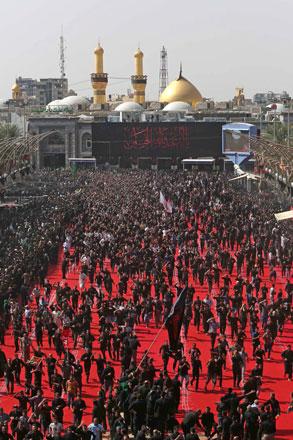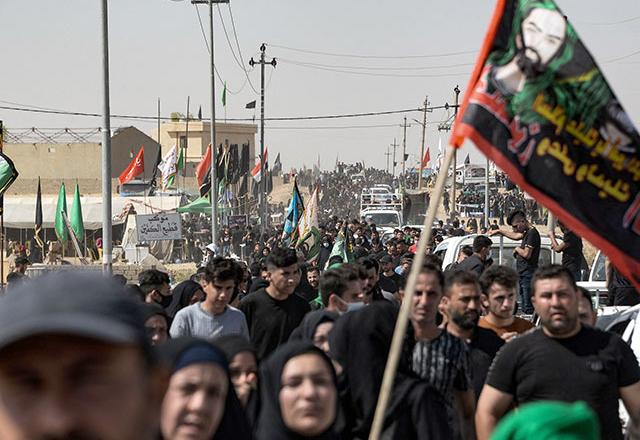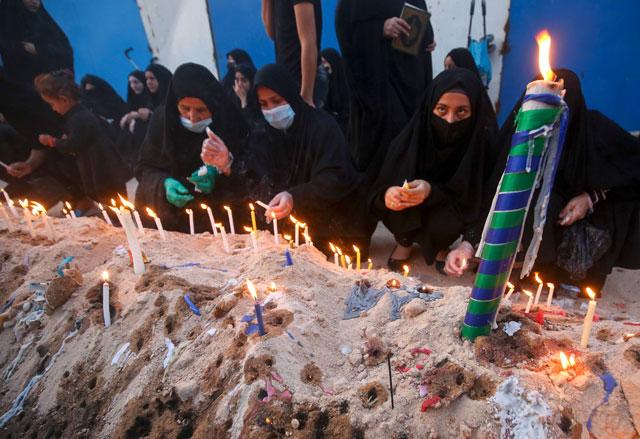You are here
Crowds mass in Iraq's Karbala for mourning ritual
By AFP - Oct 24,2015 - Last updated at Oct 24,2015

Iraqi Shiite Muslims take part in a procession between the shrines of Imam Hussein and Imam Abbas to mark Ashura, on the tenth day of the mourning period of Muharram, in the central city of Karbala, on Saturday (AFP photo)
KARBALA, Iraq — Huge crowds of black-clad Shiite faithful massed in the Iraqi city of Karbala Saturday, crying and beating their chests to commemorate the 7th century killing of the prophet's grandson.
The holy day of Ashura was marred by attacks in Pakistan and Bangladesh, but unfolded peacefully in southern Iraq, where last year's security fears have given way to political grievances.
Gathered under the golden dome of Imam Hussein's mausoleum in Karbala, devotees clutching paper tissues wailed and wiped their tears as they listened to accounts of Hussein's death.
The dirge cantor himself repeatedly choked back tears as he sang the praise of Hussein, whose 680 AD killing by the armies of Caliph Yazid lies at the heart of the Sunni-Shiite schism.
Many Shiite worshippers travel from neighbouring Iran and other countries each year to visit the shrine, which lies about 80 kilometres southwest of Baghdad.
Millions of others across the Shiite world, from Lebanon to south Asia, hold processions in their home towns, performing a variety of rituals, many involving flagellation.
Some beat their backs to a drumbeat using chains or blades. Others beat their heads with a sword until their faces and their white mourning robes are covered in blood.
Karbala and other cities hosted traditional reenactments of Hussein's martyrdom, complete with horseback warriors and the torching of the camp where the third Shiite imam and his vastly outnumbered followers made their last stand.
The 10th day of the mourning month of Muharram has been marred by attacks in the past and Iraq deployed tens of thousands of security forces across the country.
"Our forces have set up a security plan that includes more than 20,000 members of the security forces," Qais Khalaf Rahima, a senior army commander, told a news conference in Karbala on Friday.
They formed three concentric security rings around Karbala, banned traffic in the city centre three days ago and used special explosives detection equipment, he and the Karbala police chief explained.
Political grievances
The measures are aimed at reducing the risk of suicide bomb attacks by the Daesh terror group, which controls parts of Iraq and considers Shiites heretics.
Karbala province borders the vast Anbar region, which is a Daesh stronghold.
Baghdad's early efforts in the counter-offensive that followed the devastating jihadist assault launched across Iraq in June 2014 focused on securing Karbala and the other holy Shiite city of Najaf, further south.
Military operations against Daesh south of Baghdad were successful and the commemorations in Karbala, as well as the various processions in Baghdad and southern Iraq, felt less exposed than last year's.
In Pakistan, Ashura was marred by a suspected suicide blast which targeted Shiites in the southern city of Jacobabad and killed at least 24, according to a provincial minister.
At least one person was also killed and nearly 80 wounded in a bomb attack on the main Shiite shrine in Bangladesh's capital Dhaka Saturday, police said.
The commemoration, the saddest day in the Shiite calendar, had political undertones in Iraq, where many of the faithful vented their resentment towards the country's leadership.
"Remembering Imam Hussein gives us the strength to fight corruption and those who are responsible for it in government," said Kadhem Hussein.
The 52-year-old, who comes from his southern hometown of Basra every year for Ashura, wore a black shirt and stood in the middle of a huge crowd following the dirge on screens outside the shrine.
The past few months have been marked by mounting popular discontent over the lack of services and corruption.
Prime Minister Haider Al Abadi has announced a reform package but the measures are slow to take effect and weekly protests in Baghdad and elsewhere have continued.
"Our politicians try to cast themselves as close to Imam Hussein but who stole the state's money?" said Jassem Mohammed, a 40-year-old man from Najaf.
Related Articles
KARBALA, Iraq — Hundreds of thousands of Shiite Muslim pilgrims gathered in the Iraqi shrine city of Karbala on Sunday for ceremonies markin
KARBALA, Iraq — Masks were almost nowhere to be seen Thursday as millions of pilgrims thronged the Iraqi shrine city of Karbala for the Shi
KARBALA, Iraq — Tens of thousands of Shiite Muslim pilgrims, some in masks and gloves, flooded Iraq’s Karbala on Sunday to mark Ashura, in o














